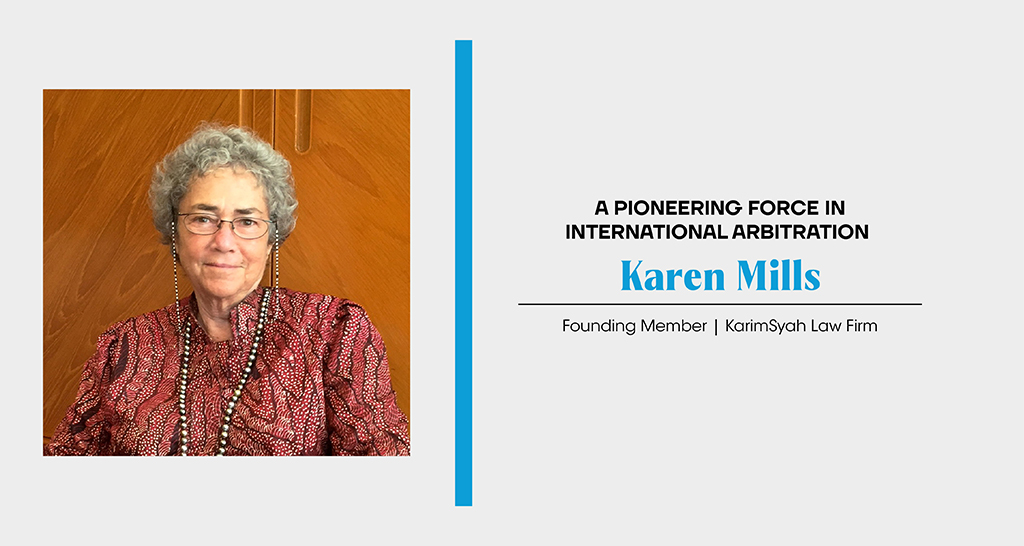Based in Indonesia, Karen Mills is a highly regarded arbitrator with over three and a half decades of expertise. She is a member of the New York Bar and a Founding Member of the KarimSyah Law Firm in Jakarta, and has established herself as a leading figure in global arbitration, handling complex cases across various industries and advising government, state-owned companies, and MNCs. With a legacy of excellence and a reputation that precedes her, Karen has become the go-to expert for the most complex and high-value disputes across Asia.
A Life-Shaping Journey to Indonesia
Karen’s journey is a long story. After practicing law in New York, she travelled across the Pacific, meeting her future husband, an anthropologist. Together, they collected tribal art from the Pacific Islands and Indonesia in the early 1970s, drawn by the people, culture, and lifestyle. But she wanted to return to the legal profession, and chose Jakarta as her desired venue. It took a few years to build her reputation, working with leading lawyers before co-founding her current firm in 1997.
A Pivotal Moment in International Arbitration
A major turning point came in 1990 when Karen attended a Maritime Arbitration Conference in Hong Kong. There, she met Neil Kaplan, a renowned figure in arbitration, through mutual acquaintances, including her former client, CH Tung. Kaplan became a mentor, guiding her through the process of becoming a Fellow and Chartered Arbitrator of the CIArb. Kaplan also encouraged her to set up the Indonesian Chapter of the CIArb, and her involvement with CIArb has continued to grow, having also served for a number of years on the Main Management Committee of the East Asia Branch, as well as her continuing role as Advisor to the Indonesian Chapter.
Ms. Mills was one of the first Directors of ArbitralWomen and served on their Executive Board for over 20 years. She was also one of the first Arbitrators to serve as judge in the Vis East Moot Competition, having thus supported it since it commenced, as well as coached many teams, and is a member of the Board of Directors of the Vis East Foundation.
Shaping Professional Growth
Reflecting on her career, a notable decision was leaving a well-established practice in New York to cross the Pacific and settle in a new location. While this move could be seen as a risk, Karen does not perceive it that way. Instead, she views it as a chance for growth and exploration. This experience has shaped her professional journey, allowing her to adapt to new environments and build a unique career path.
Guiding the Next Generation
When mentoring young talent, Karen focuses on providing guidance tailored to their specific needs and interests. She allows mentees to drive the conversation, offering advice on topics they bring forth. This approach enables her to share her experience and expertise while empowering the next generation to navigate their paths.
Karen notes that the legal profession tends to evolve gradually, with young professionals often building on established practices. By mentoring, she helps them develop the skills and knowledge needed to succeed in their careers while also encouraging them to think critically and adapt to changing circumstances.
A Pragmatic Approach to Multifaceted Responsibilities
Karen balances her various roles by dealing with things as they come, discussing matters with colleagues and stakeholders, and making decisions through mutual agreement. She doesn’t rely on extensive planning; instead, she adapts to situations as they arise. In her work, Karen considers the specifics of each case, drawing on past experiences and local best practices to inform her approach. This flexible and pragmatic approach allows her to navigate diverse responsibilities effectively.
Harnessing the Latest Technologies
Technology is poised to significantly reshape international arbitration practice. Online dispute resolution and virtual hearings have proven particularly beneficial, saving time, trouble, and money. These innovations have been especially valuable during the Covid pandemic and are likely to be a staple of dispute resolutions. While AI poses potential dangers like abuse and fake news, online dispute resolution can be a great boon if used carefully. To assure legitimacy, it is important to mitigate the risks related to AI and maintain transparency in digital proceedings. With the right precautions, technology can make dispute resolution quicker, easier, and less expensive.
Required Reforms in Arbitration
The arbitration world requires several reforms and innovations. One pressing issue is the unnecessary requirements for official certificates to confirm signatory status to the New York Convention, which can cause delays and raise costs. The selection of arbitrators also lacks diversity, with a dominance of senior men. To address this, more diverse appointments are needed, considering factors like gender, culture, seniority, and experience. Implementing time limits for institutional vetting of awards can prevent delays, and encouraging mediation early in the arbitration process can facilitate amicable resolutions.
The Career Highlights: Notable Achievement
One of Karen’s most notable accomplishments was serving as lead counsel for the Indonesian Government in five Investor-State Arbitrations. She particularly enjoyed a case where the Government was the Claimant, finding the issue and collaboration with government officials to be highly engaging. This experience stands out as a highlight of her career, and she would welcome the opportunity to work on similar cases, either as counsel or arbitrator.
Advice to the Younger Self
When asked what advice she would give her younger self, Karen finds it challenging to give any specific point. In general, her advice as we all age is to know where one is putting every foot. This to avoid falling, literally, but figuratively to consider every move before launching into it. Without regrets about the choices she has made, she attributes her decision-making approach to her pragmatic nature, likely influenced by her father. Her thoughtful and reflective approach to life has empowered her and enabled her to navigate different life paths with confidence.
